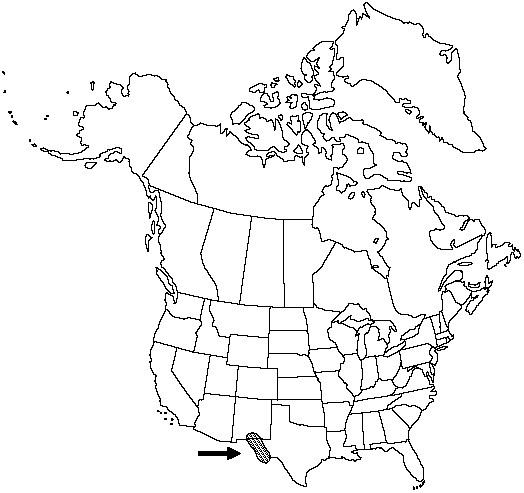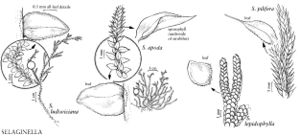Selaginella pilifera
Index Seminum (Berlin) 20. 1857.
Plants terrestrial or on rock, forming rosettes. Main (central) stem spirally compact, branched, branches 2–3-forked, prostrate, flat when moist, almost flat when dry, not articulate, glabrous. Rhizophores borne on underside of stems, restricted to base of rosette, 4–5 mm diam. Leaves thick and stiff. Lateral leaves overlapping, ascending, green, elliptic to elliptic-ovate, (2–) 3–3.5 × 0.8–1 mm; base cordate, with 2 ciliate lobes or auricles; margins transparent, acroscopic margins short-ciliate at base, dentate toward apex; basiscopic margins entire to scattered dentate; apex bristle 1/3–1/2 length of leaf-blade. Median leaves peltate, oblique-lanceolate, 2–3 × 0.7–1 mm; base rounded to truncate, pubescent; margins green to slightly transparent, inner margins dentate, outer margins entire or slightly dentate; apex bristle 1/3 length of leaf-blade. Strobili solitary, 5–10 mm; sporophylls monomorphic, lanceolate-ovate, slightly keeled, keel not dentate, base pubescent, margins transparent to greenish, short-ciliate to denticulate, apex long-bristled. 2n = 20.
Habitat: Dry rocky soil, rock crevices, limestone rock, and cliff faces
Elevation: 1500–2500 m
Distribution

N.Mex., Tex., n Mexico
Discussion
Selaginella lepidophylla Mettenius is a misapplied name.
The long-bristled leaf apex of Selaginella pilifera is unique among New World xerophytic members of subg. Stachygynandrum series Circinatae Spring. The closest relative of S. pilifera is S. gypsophila A. R. Smith & T. Reeves, which is from Nuevo León, Mexico, and differs by having obtuse leaf apices. Further studies are needed to determine whether S. gypsophila represents a well-differentiated species or an environmental variant of S. pilifera.
Of conservation concern.
Selected References
None.
Lower Taxa
"thick" is not a number.
